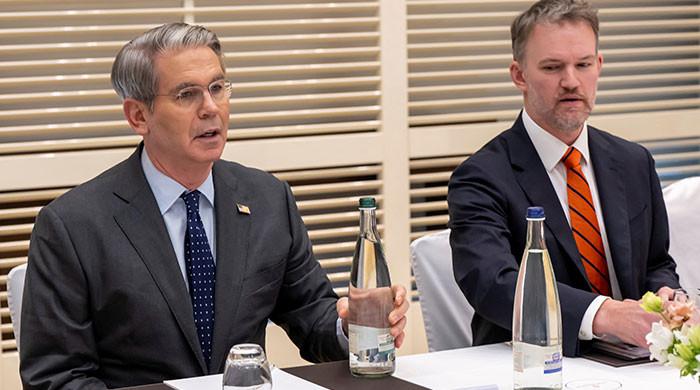Geneva: United States and China concluded the first day of high -risk commercial conversations in Geneva on Saturday, their first face -to -face meeting since President Donald Trump imposed a new wave of tariffs steep Chinese imports.
The discussions behind closed doors, held in the residence of the Swiss ambassador, occur when both parties indicate a cautious will to discourage one of the most severe commercial clashes in recent years.
The United States Treasury Secretary Scott Besent, and Commerce Representative Jamieson Greer met with the Vice Primer Chinese Minister, He Lifeng on Saturday at the Swiss Ambassador residence. The discreet Villa in Lake Geneva was the scene of what the Chinese state media described as an “important step” to facilitate tensions.
The conversations will continue on Sunday, according to a source close to discussions.
Trump tariffs now total 145% in Chinese imports, with some products that face an amazing 245% tax. Beijing responded with 125% tariffs on US goods, pushing both countries on the edge of almost total commercial freezing.
On Friday, Trump hinted that he could reduce tariffs, publishing online that “80% tariff on China seems correct!” But his press secretary, Karoline Leavitt, later said any reduction would depend on Chinese concessions. The message was clear: two are needed for tango.
The Secretary of Commerce, Howard Lutnick, said Trump was open to decallation, but that the tariffs were not reduced free. “The president would like to resolve it with China,” he said. “He would like to unwishly the situation.”
‘The relationship is not good’
“The relationship is not good,” said Bill Reinsch at the Center for Strategic and International Studies. “We have prohibitive trade tariffs that go in both directions.”
Even so, analysts saw the meeting as a positive signal.
Xu Bin, a professor at the European International Business School, said the fact that the two parties were talking at all was significant. “China is the only country that has responded in kind to Trump’s tariffs,” he said.
Besent made it clear that the conversations would focus on “decalcalation”, not on a radical commercial agreement.
Meanwhile, China wants the United States to raise tariffs before making great movements. A comment at the China Xinhua news agency warned that “trade wars and rates battles do not produce winners”, a reminder that both parties are bleeding.
The United Kingdom Agreement offers Glimmer of Hope
Trump reached a separate agreement with Great Britain two days before the Geneva meeting, its first commercial pact since it launched global tariffs. The five -page agreement offers specific relief of the sector on steel, aluminum and British cars, in exchange for greater access from the United Kingdom for beef and US agricultural products.
A 10% reference tariff remains in most imports from the United Kingdom, although Trump suggested that “if someone did something exceptional for us.”
Meanwhile, China’s latest export figures increased unexpectedly, helped by a change in trade to Southeast Asia: a possible Beijing signal is finding ways to avoid the duties of the United States.
They are the first days, but Geneva conversations can mark the beginning of a thaw. For now, both parties keep their cards near their chest, and hoping not to shoot in the foot.




